SUMMARY
This is AI generated summarization, which may have errors. For context, always refer to the full article.
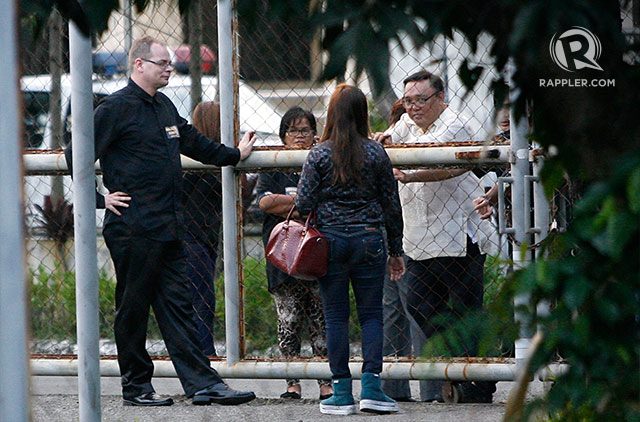
MANILA, Philippines – Harry Roque has always been a master at getting himself in the news. He has a way with words and knows how to play to the camera to get his causes the media mileage they need to force national – even international – conversations.
In Jakarta in 2010, Roque championed justice for journalists slain in the world-denounced Maguindanao massacre. The law professor from the University of the Philippines College of Law won sympathies for the cause when he joined a protest rally hand-in-hand with a victim – a widow of a local journalist – whose tears during a press conference broke the hearts of human rights advocates in the region.
Roque was never afraid of presidents. He hounded Gloria Macapagal Arroyo and Benigno Aquino III over various issues. Neither was he afraid of the military.
In 2014, Roque caused a commotion inside Camp Aguinaldo when he entered a restricted area and failed to stop his clients – the relatives and boyfriend of the Filipina transgender allegedly slain by a US Marine – from breaching military gates in their attempt to confront the US serviceman. The Armed Forces of the Philippines filed a disbarment case against Roque.
A private lawyer, Roque earned a reputation for being a fighter for the poor and underprivileged. He fought for human rights and international humanitarian law, for press freedom, and for the country’s rights to the West Philippine Sea (South China Sea) focusing on the rights of Filipino fishermen to the disputed waters.
He focused on the same issues as representative of Kabayan party-list group.
Love him or hate him, Roque is a man you’d probably want on your team. But in November 2017, the champion of small people thought it was time for a change. He became the spokesperson of the country’s most powerful man, President Rodrigo Duterte.
Never mind that the President has beliefs contrary to what he fought for throughout the years.
Roque pirouettes on 3 big issues
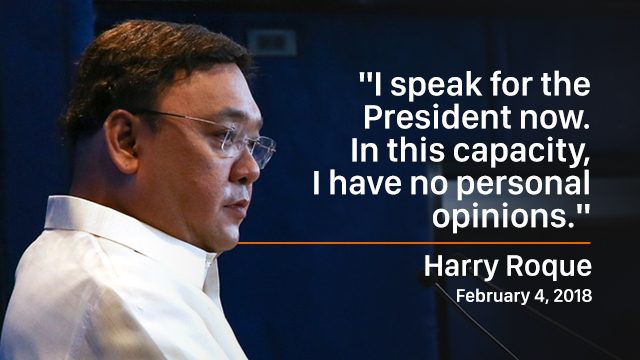
There are many issues that Duterte and Roque disagree on. But the past 4 months saw how Roque had no qualms changing his tune to defend his boss.
We focus on 3 big issues he championed as private lawyer:
- the country’s rights to the West Philippine Sea
- killings in the name of Duterte’s drug war
- press freedom in the Philippines
There were instances when Roque contradicted himself outright and there were times he resorted to legalese to deflect the issue.
“I speak for the President now. In this capacity, I have no personal opinions,” Roque told Rappler on Wednesday, February 14, when asked about his statements on these 3 issues.
“I ceased to have personal opinions,” he said.
But can he speak for the President without gambling his legacy away, Rappler asked him. “Nope. It’s a job,” he said.

Roque’s pirouette is perhaps most stark on the issue of China’s actions in the West Philippine Sea. Roque used to be a vocal critic of China’s “unlawful” actions in the West Philippine Sea (South China Sea).
“China has resorted to unlawful use of force to advance its claims to vast amount of waters in the West Philippine Sea and has shunned a peaceful means to settle its territorial dispute with the Philippines,” Roque said.
This is echoed in a petition he filed against China on behalf of Filipino fishermen who lost their livelihood when China occupied Panatag (Scarborough) Shoal off the coast of Zambales province.
“The perpetrators of the human rights violations are China’s state agents consisting of the members of the Chinese Coast Guard and other maritime agencies of China who patrol the fishing areas in Scarborough Shoal. These state agents of China are distinguished by their orange uniforms, and by the markings on the maritime vessels that they use,” the petition read.
He also filed a bill to declare the Spratlys a protected area and to create a Spratlys Development Authority to ensure that the country is able to maximize the resources there.
Roque also supported the international case of the Philippines against China even when he didn’t agree 100% with the strategy of the country’s lawyers.
His recent statements as Duterte’s spokesman thus came as a surprise.
“There will come a time when China’s might has ceased, when we will have to thank them for those islands….Clearly, eventually, those artificial islands will be ours if we can ask China to leave,” Roque said on February 7, 2017.
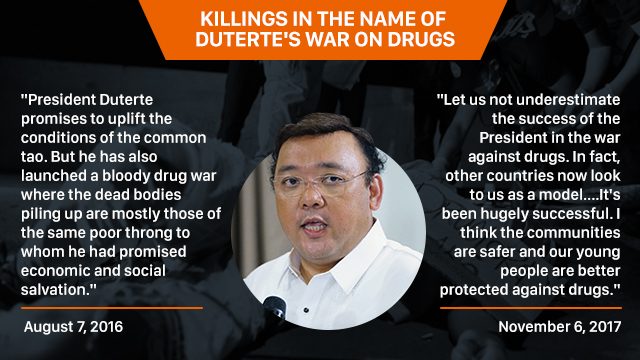
There is no dispute that Roque had always wanted Duterte probed for his role in the Davao Death Squad vigilante killings in Davao City. He had slammed the previous Aquino government for failing to investigate Duterte.
“PNoy, since Day One of his administration, should have investigated Duterte for these killings….He knew that Duterte may have been involved, and he did nothing to investigate and prosecute him,” Roque said in a statement on May 28, 2015.
“Those who know about the killings perpetrated by the death squads also know that somehow, the death squads operate with permission, if not upon orders of the mayor,” Roque said.
Roque spoke against the government’s war on drugs in one of his first privilege speeches as newbie lawmaker in the House of Representatives.
“President Duterte promises to uplift the conditions of the common tao. But he has also launched a bloody drug war where the dead bodies piling up are mostly those of the same poor throng to whom he had promised economic and social salvation,” he said on August 7, 2016.
Human rights and international humanitarian law are issues close to Roque’s heart, advocacies that the law firm he founded continued to pursue when he joined the House of Representatives.
Centerlaw is responsible for the very first legal challenge to Duterte’s drug war. Centerlaw secured a writ of amparo for Efren Morillo and relatives of other drug suspects killed in the police’s Oplan TokHang. It filed murder complaints against local policemen before the Office of the Ombudsman and filed a petition before the Supreme Court (SC) on behalf of 35 residents of San Andres Bukid in Manila who were killed in police operations.
As spokesperson, Roque turned into a defender of Duterte’s bloody war on drugs. (READ: Roque-founded law firm vows to continue fighting Duterte’s drug war)
“Let us not underestimate the success of the President in the war against drugs. In fact, other countries now look to us as a model….It’s been hugely successful. I think the communities are safer and our young people are better protected against drugs,” he said on November 6, 2017.
Roque also resorts to legalese. He called detained Senator Leila de Lima and Commission on Human Rights Jose Luis Gascon “hypocrites” for failing to recognize that drug suspects cannot be considered victims of summary killings under Administrative Order No. 35 signed under the previous Aquino administration.
“If the two believed then that the AO they adopted was correct and in accordance with the law, they should be the first to defend the Duterte administration’s campaign against illegal drugs because the AO No. 35 signed by former President Benigno Aquino III is correct,” Roque said.
A former colleague at the House of Representatives, Albay Representative Edcel Lagman, slammed Roque’s turnaround from being a critical voice to becoming the leading apologist for Duterte’s war on drugs.
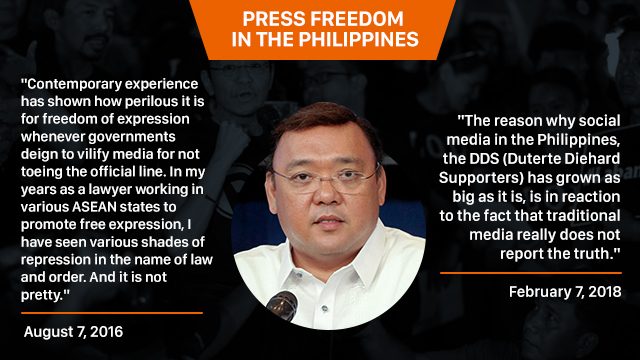
“I have nothing more to prove when it comes to my position on the freedom of the press and speech,” Roque said amid calls for him to resign in the wake of the government’s attacks on press freedom. (READ: Roque: I’ll resign if Duterte tramples on press freedom)
Duterte has been making a punching bag out of television network ABS-CBN, newspaper Philippine Daily Inquirer, and online news site Rappler, among others, over critical stories against him and his administration.
In another lifetime, Roque would have been expected to take the cudgels for the media as he did during the tumultuous years of former president Arroyo. Roque gathered Filipino journalists for a class suit against former first gentleman Jose Miguel Arroyo, who was back then filing libel cases left and right.
But Roque now leads the vilification of the media. “The reason why social media in the Philippines, the DDS (Duterte Diehard Supporters) has grown as big as it is, is in reaction to the fact that traditional media really does not report the truth,” Roque said on February 7, 2018.
In a statement released on Facebook, the National Union of Journalists of the Philippines said Roque “completed his metamorphosis from a lawyer who built his reputation as a defender of freedom of the press and of expression, into a true blue peddler of ‘fake news’ when he knowingly mouthed the canard that mainstream media ‘does not report the truth,’ thus driving people to seek the truth in liars like him!”
Roque, who used to caution against “repression” of press freedom “in the name of law and order,” had no sympathies for Rappler when the government revoked its license for alleged violation of the Constitution.
“The Securities and Exchange Commission (SEC) is empowered to determine the legality of corporations….We respect the SEC decision that Rappler contravenes the strict requirements of the law that the ownership and the management of mass media entities must be wholly-owned by Filipinos,” he said on January 15, 2018.
Roque’s former law firm disagrees with his stand on the government’s case against Rappler. Centerlaw slammed the SEC ruling as “prior restraint” and thus being unconstitutional.
Martial law and UP protesters
Roque made other controversial statements on other issues – big and small – that raised eyebrows.
He made an exemption for Duterte’s declaration of martial law in Mindanao despite his long-held view against its revival in the Philippines.
“The Dawlah Islamiya remains determined to establish an IS wilayat in Mindanao. With martial law in place, our defenders can establish a tighter net against these rebels and terrorists who will not stop until they are completely defeated,” Roque said on December 23, 2017, amid a bid to extend martial law by another year.
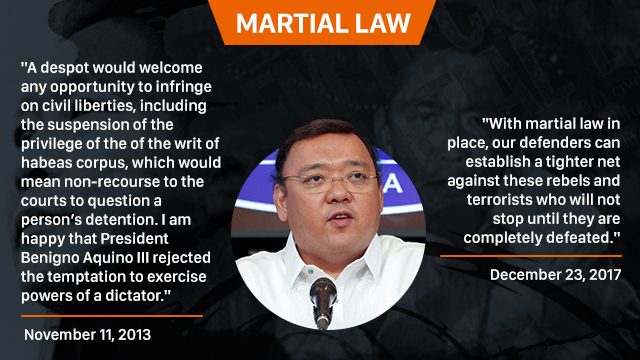
Roque was previously so cautious when Duterte declared a national emergency in 2016 in the aftermath of the Davao City bombing. He issued a statement to clarify that a national emergency wasn’t tantamount to a declaration of martial law.
He back then cautioned against the violation of civil liberties if martial law was declared, recalling what happened not only under the martial law of the late dictator Ferdinand Marcos but also under Arroyo’s.
“My political education must be the realization of my lolo’s aspirations: the use of the legal profession as a tool to promote democracy and to spoil the day for despots,” he declared in a post that recalled how his grandfather taught him the lessons of the Marcosian Martial Law.
He was also all praises when Aquino refused to declare martial law despite the decline of the rule of law and the massive looting in the aftermath of Super Typhoon Yolanda (Haiyan) in Central Visayas. “A despot would welcome any opportunity to infringe on civil liberties, I am happy that PNoy rejected the temptation to exercise powers of a dictator,” Roque said.
Roque also got his old students in the University of the Philippines riled up on social media when he said that their propensity to attend protest rallies is a waste of taxpayers’ money.
He used to require his students to attend protest rallies.
Roque’s political ambition?
There were those who welcomed Roque’s appointment in the hope that the lawyer would elevate the discourse in Malacañang. But others had been suspicious of him from the beginning, knowing about his political ambitions. (READ: NUJP slams Roque as fake news peddler)
Roque was vocal about his senatorial ambitions in 2016 when he was supposed to join the ticket of defeated presidential candidate Jejomar Binay. He didn’t pursue his bid then.
Roque didn’t get an easy start in Malacañang. He immediately earned the ire of the bloggers backing Duterte when he said he was going to explain to them the important role of traditional media. (READ: Roque to DDS: Don’t throw anything at legitimate journalists and Rabid pro-Duterte bloggers slam Roque for defending the media)
But hopes that Roque would uphold his advocacies in Malacañang soon fell apart. He also aligned himself with bloggers who criticized the traditional media, and turned himself into a factory of statements that became even more controversial than those of his boss.
Despite all the criticism, Roque appeared unfazed and continued to spew one controversial statement after another. His February 7 interview with pro-Duterte blogger Franco Mabanta is perhaps one of the most controversial so far, calling on the public to appreciate what China is doing in the West Philippine Sea while slamming traditional media’s credibility.
It appears it’s no longer the traditional media’s attention that Roque seeks these days. Besides, for him, it’s all just a job. – Rappler.com
Add a comment
How does this make you feel?
There are no comments yet. Add your comment to start the conversation.